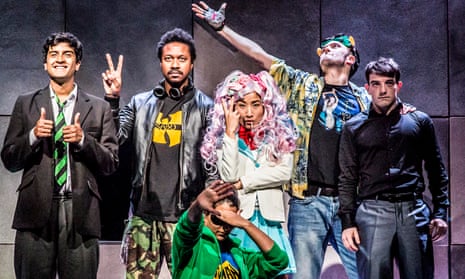The story of LulzSec is one of trust and betrayal, justice and lawlessness, authority and subversion. In the winter of 2010, six geographically disparate people came together online to form a hacking group that delighted some, infuriated others and quickly came to the attention of law enforcement on both sides of the Atlantic.
The crux of the drama – in which one of the six must decide whether to stay faithful to family or unseen friends – has a Shakespearean depth, but there’s the problem of how you introduce an audience to the idea of online chatrooms, where thousands of people are “present” anonymously, yet in the real world are sat at a keyboard with a real name and real life attached to everything they do.
Tim Price, who has previously written plays about Chelsea Manning and the Occupy Movement, took on the task of bringing LulzSec’s rise and fall to the stage, with Teh Internet is Serious Business, now showing at the Royal Court in London. His first challenge was to convey the peculiar world of online chatrooms, particularly the culture of trolling, or aggressively aiming to outrage. This isn’t occasional, it’s de rigueur. “The use of misogynyistic, homophobic language on those boards is designed to get people to censor them,” Price says. “It’s used as a political device. It’s not the actual opinions people hold.”
Everything LulzSec did happened online – hacking everyone from Sony to the CIA – on that implausible stage known as the internet. None of them met while they were active. Most still haven’t. Jake Davis (aka Topiary, a Shetlander) and Mustafa al-Bassam (aka TFlow, a Londoner of Arabic extraction) only met for the first time when they were in the dock in London, accused of various hacking crimes.
“Or was it just outside?” says the naturally gregarious Davis to the quieter Al-Bassam, as we wait to go in and see the show. “We went to a Wetherspoons.” Davis was the voice of LulzSec, its public face, the one who loved to taunt and tease and troll. Al-Bassam was a hacker, making computers dance to his demands. For the staging, Price eschewed screens: though the characters do speak in the gobbledegook of code, the computers they command are represented by dancers.
Meanwhile, the panoply of people online is depicted through a multitude of forms – a penguin, a bear, a dog – and the members of the group through their self-representations. These include LulzSec’s “Kayla”, depicted as a Japanese woman dressed in a child’s clothing riding a girl’s bicycle. Online, Kayla insisted that the real-world Kayla was a girl; the question of whether that was true exercised many, though not the members of LulzSec.
Davis’s progress, starting in a dressing gown, echoes that of Arthur Dent in The Hitchhiker’s Guide to the Galaxy. He’s plucked from the ruins of his family by the discovery of the boards, making his experience at first look like The Hitchhiker’s Guide to Cyberspace. But as his influence grows, he casts that off to become clothed, and then besuited, the spokesman for an unseen throng. “Jake is a child of the trolling culture,” says Price. “Mustafa is a child of the hacking culture. They’re the yin and yang.”
Yet LulzSec’s story is hard to tell, not because it isn’t compelling, but because it looks so different to every observer and participant. Its downfall hinged on one hacker’s choice when confronted by the police: betray the people you care for and see every day, or those with whom you spend “20 hours a day together online”. If you think that’s an easy choice, you haven’t experienced the intimacy of an online group.
I was, in a minor way, more than an observer. In covering the rise of the Anonymous hacking network, I communicated with Topiary before he was part of LulzSec, and later became entangled in a Twitter exchange with Sabu, LulzSec’s nominal leader, as they were being hunted on two continents. LulzSec published my mobile phone number on their Twitter feed, which led to my receiving 100 or so voicemails in short order. As injuries go, it was minimal – as I realised on seeing Davis in court, facing years in jail if convicted.

After watching the show, Al-Bassam, now studying computer science at university, says he didn’t find watching the depiction of himself surreal. “It’s a play based on things that happened in a chatroom. It was text typed on a keyboard. I feel like this is something new – something I never experienced.”
The hardest thing for most people unfamiliar with 4chan, trolling or Anonymous to grasp is that the worst fate that can befall participants is to have their real name attached to their online handle. People strive never to give away personal details. “Doxxing”, publishing documents to identify people, is the closest thing there is to crime in those chatrooms, yet also the stock-in-trade of many.
Why does this matter so much? Because, says Price, pseudonyms allow people to speak out, regardless of their apparent position in society. “Mustafa had a lot of ideas,” he says. “If he was identified as just a 15-year-old, he couldn’t get them across. But as Tflow, he could organise a political movement. That’s the lesson of the story.”

Comments (…)
Sign in or create your Guardian account to join the discussion